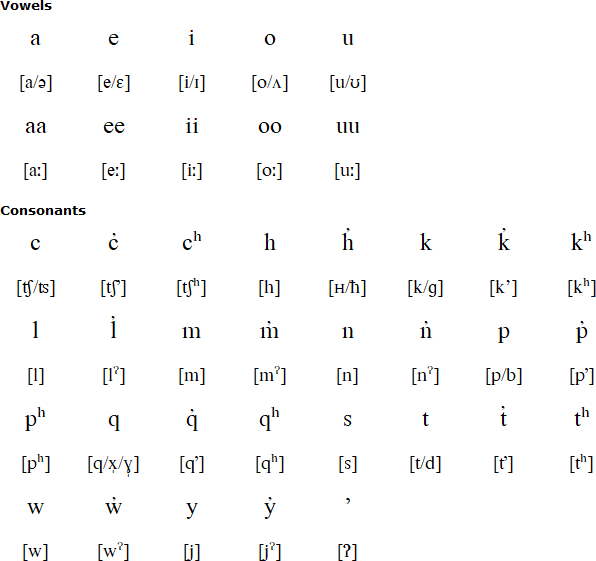Achumawi is spoken by the Pit River people, who live along the Pit River in northeast of California from Goose lake to the northern Sacramento Valley. It is thought to be related to Atsugewi, which is spoken nearby, and the two language are classified as belonging to the Palaihnihan language family. In 2000 there were just eight elderly speakers of Achumawi, which is also known as Achomawi or Pit River language. The name Achumawi comes from ajúmmááwí, the name of the Fall River band, from ajúmmá (river).
Development of an app to help people learn Achumawi started in 2013.

Achumawi has two tones: a high tone, which is indicated by an acute accent (á), and a low tone, which is not indicated.
Download alphabet charts for Achumawi (Excel)
wéé sintámmak kúci qá pi qa tówsi w̓al qá woh̓ w̓al. amqʰááwa tiiyúmciw̓oy paláqmim. qa pálm̓as íty̓íc̓í ka tyktatíwwalmíwci. hak̓can wínín maník̓can wiy̓í tyktúw. yalyúúcan w̓al múútʰaaq̓álcan w̓al amqʰá máník̓can wiy̓í tyktúw.
Now I'm going to tell this about the deer and the bear. Because they used to live together. When they first [establised their homes] they were neighbours. They each had two children. There was a boy and a girl (for each). They lived there. They were neighbours.
Part of Bear Woman and Dear Woman
Information about the Achumawi language
https://en.wikipedia.org/wiki/Achumawi_language
https://www.ethnologue.com/17/language/acv/
http://roa.rutgers.edu/files/316-0599/roa-316-nevin-4.pdf
http://www.native-languages.org/achumawi.htm
http://linguistics.berkeley.edu/~survey/languages/achumawi.php
http://www.endangeredlanguages.com/lang/acv
Abaza, Abkhaz, Adyghe, Aghul, Akhvakh, Akkala Sámi, Aleut, Altay, Alyutor, Andi, Archi, Assyrian / Neo-Assyrian, Avar, Azeri, Bagvalal, Balkar, Bashkir, Belarusian, Bezhta, Bosnian, Botlikh, Budukh, Bulgarian, Buryat, Chamalal, Chechen, Chelkan, Chukchi, Chulym, Chuvash, Crimean Tatar, Dargwa, Daur, Dolgan, Dungan, Enets, Erzya, Even, Evenki, Gagauz, Godoberi, Hinukh, Hunzib, Ingush, Interslavic, Itelmen, Juhuri, Kabardian, Kaitag, Kalderash Romani, Kalmyk, Karaim, Karakalpak, Karata, Karelian, Kazakh, Ket, Khakas, Khanty, Khinalug, Khorasani Turkic, Khwarshi, Kildin Sámi, Kili, Komi, Koryak, Krymchak, Kryts, Kubachi, Kumandy, Kumyk, Kurdish, Kyrgyz, Lak, Lezgi, Lingua Franca Nova, Lithuanian, Ludic, Macedonian, Mansi, Mari, Moksha, Moldovan, Mongolian, Montenegrin, Nanai, Negidal, Nenets, Nganasan, Nivkh, Nogai, Old Church Slavonic, Oroch, Orok, Ossetian, Pontic Greek, Romanian, Rushani, Russian, Rusyn, Rutul, Selkup, Serbian, Shor, Shughni, Siberian Tatar, Sirenik, Slovio, Soyot, Tabassaran, Tajik, Talysh, Tat, Tatar, Teleut, Ter Sámi, Tindi, Tofa, Tsakhur, Tsez, Turkmen, Tuvan, Ubykh, Udege, Udi, Udmurt, Ukrainian, Ulch, Urum, Uyghur, Uzbek, Veps, Votic, Wakhi, West Polesian, Xibe, Yaghnobi, Yakut, Yazghulami, Yukaghir (Northern / Tundra), Yukaghir (Southern / Kolyma), Yupik (Central Siberian)
Languages written with the Latin alphabet
Page last modified: 23.04.21
[top]
You can support this site by Buying Me A Coffee, and if you like what you see on this page, you can use the buttons below to share it with people you know.

If you like this site and find it useful, you can support it by making a donation via PayPal or Patreon, or by contributing in other ways. Omniglot is how I make my living.
Note: all links on this site to Amazon.com, Amazon.co.uk
and Amazon.fr
are affiliate links. This means I earn a commission if you click on any of them and buy something. So by clicking on these links you can help to support this site.
[top]